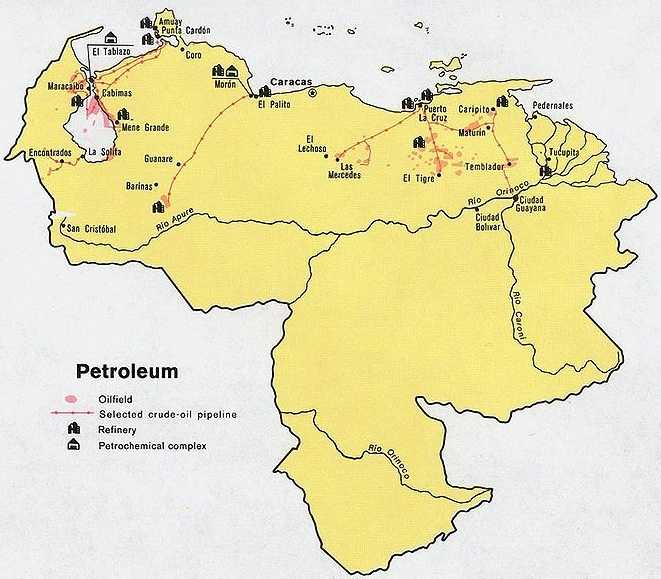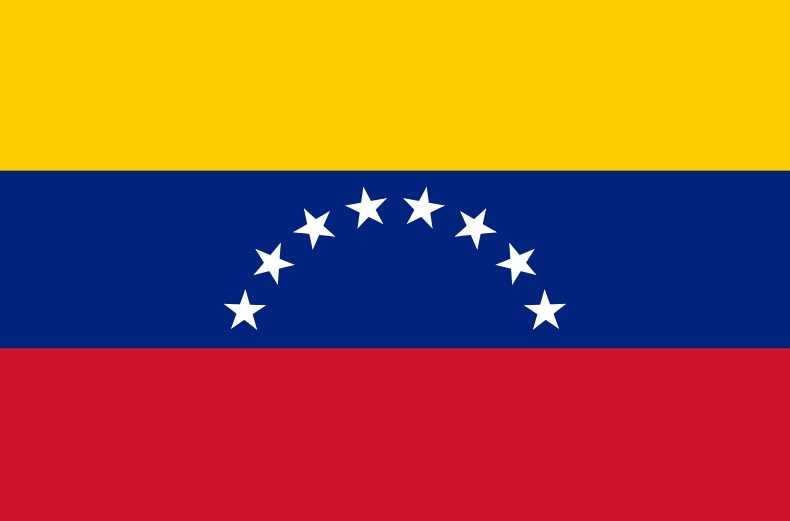The Venezuelan economy should be the richest of the Americas, it has more oil reserves than anywhere in the world, even more than Saudi Arabia.
So why do its people have to queue up to buy scarce supplies of toilet paper and flour?
Venezuela, in proven oil reserves, has 297,570 mmbl (million million barrels of oil), Saudi Arabia has 267,910 mmbl, according to the US Energy Information Administration.
The country is large, 916,445 square kilometers (353,841 sq mi) and has a population of fewer than 30 million people. Compare that to the United Kingdom’s 243,610 km2 (94,060mi2) and a population of 63 million.
Venezuela is one of the most highly biodiverse countries in the world: to the west is the mountainous region of the Andes, the Amazon Basin rainforest in the south, the Orinoco River Delata in the East, and some of the world’s most beautiful beaches in the north. It is next door to Latin America’s largest market, Brazil, and across the Caribbean from the United States.
If an alien were to look upon planet earth and choose which countries were the most blessed regarding resources, inhabitants per square mile, and strategic position, Venezuela would be right up there among the top five.

The Venezuelan economy – a tragedy of decades of mismanagement
Venezuela has always been the leading economy that never was. Much of the media has focused on the country only since Hugo Chávez came into office. However, the country’s pitiful path goes back well before his arrival.
This article focuses on Venezuela from 1973, although before that time the country was fraught with mismanagement and instability.
In 1973 Carlos Andrés Pérez won the elections and became president. During that same year the oil crisis hit, which sent oil prices rocketing, a blessing for an oil-exporting country like Venezuela.
In 1976 the country nationalized the oil industries.
Venezuela’s enormous rise in oil-income triggered massive public spending increases, but also huge rises in external debts. Debts continued to grow until the 1980s when oil prices collapsed, crippling the economy.
Much of the public spending increases occurred in an environment of waste, ineptitude and corruption, i.e. there was much less return in investment than one would expect.
In February 1983 Venezuela’s currency was devalued, a measure needed so that it could service its debts. The standard of living of Venezuelan citizens dropped significantly.
The rest of the 1980s and 1990s saw one failed economic policy after another, growing corruption, increasing poverty and crime, a serious deterioration of social indicators, and progressively worsening political instability. People all over Venezuela despaired at how a country with such resources could have gotten itself into such a mess.
On February 27th, 1989, there was a wave of protests, riots, and shootings in the capital, Caracas. The clashes, which went on for over a week, resulted in the deaths of hundreds of people. The massacre is known locally as the “Sacudón” or the “Caracazo”.
People protested because the government’s economic reforms had led to considerable price increases in gasoline (an oil exporter) and transportation.
There were two attempted coups in 1992. Hugo Chávez led an unsuccessful one against the Pérez government during that year, for which he was imprisoned. In March 1994, after two years in jail, he was pardoned by President Rafael Caldera “with a clean slate and his political rights reinstated.” When he was released from prison he founded the Socialist Party.
President Pérez, who had been re-elected in 1988 was impeached for corruption in 1993.
It is important to point out that during the 1980s and 1990s Venezuela was led by Western-friendly administrations.
Hugo Chávez came into power in 1998
Hugo Chávez was elected President in 1998, mainly due to a total collapse in confidence of the existing parties. He launched the “Bolivarian Revolution”. In 1999 a Constituency Assembly was set up to write a new constitution.
In 2002, a coup d’état briefly ousted Chavez from power. However, after military interventions and popular demonstrations he soon returned to power.
A national strike that lasted from December 2002 to February 2003 and included a strike/lockout of PDVSA (the state oil company) nearly brought the country to a standstill. During the first four months of 2003 the Venezuelan economy shrank 27%. Capital flight became rampant, which triggered a re-imposition of currency controls.
From 2003 to 2013 Venezuela underwent several currency devaluations, which sadly did very little to improve the country’s citizens’ ability to manage their shopping basket.
Hugo Chávez survived a recall referendum in August 2004, was re-elected in December 2006 and then again for a third term in October 2012. During his last re-election he was battling terminal cancer and died on March 5th, 2013.
In April 2013, Nicolás Maduro won the presidential elections by a whisker with just 50.61% of the votes compared to opposition Henrique Capriles Radonski’s 49.12%. There were many complaints of irregularities and accusations of a rigged election result.
Political analysts say that Hugo Chávez did not win so many elections due to pure accident. Like many political strategists after the cold war, he initially won democratic elections, and then changed the constitution and other laws which undermined the checks and balances on the executive, thus ensuring his continuity, while still retaining a façade of democratic legitimacy.
Tragically for Venezuela, upon his death he left an economy in shambles, even though he presided over an oil-rich nation through a period of high commodity prices and an international financial system bursting with cash willing to lend to countries like his.
During his presidency Venezuela became progressively more dependent on oil for survival, as other sectors of the economy were nationalized and production declined.
Venezuelan economy under Hugo Chávez
Hugo Chávez came into power in 1999 after decades of crisis. The Venezuelan people had little faith in their governments, seeing them as corrupt and/or inept.
Initially, Chávez did the country a great deal of good with several campaigns to improve the health, education and the standard of living of poorer Venezuelans. These campaigns are known as the “Bolivarian Missions”.
However, as the years passed he nationalized much of the country, spent a fortune helping out friendly nations such as Cuba, and squandered much of the country’s oil wealth on non-productive projects.
Chávez expropriated over 1,000 businesses, hundreds of thousands of acres of farmland and urban properties, and in many cases with no compensation. His justification being that the owners were corrupt and the measure would help the poor.
He created a class warfare in the country, and used the term “The squalid ones” for middle- and upper-class Venezuelans.
Chávez ramped up government spending considerably, something he could do because of high oil revenues and a huge rise in government debt, which stood at $28 million when he came into power and reached approximately $90 billion by the beginning of 2013, according to the Wall Street Journal.
Government spending that went into subsidizing education, health, housing and food did help raise the standard of living of the country’s poorest people. However, Chávez’ dream of a “Socialist Paradise” was nowhere near accomplished, even after 14 years in power and massive oil revenues.
Below are some highlights of what happened to the Venezuelan economy during Chávez’ tenure:
- Inflation – has increased steadily, now standing at over 50% per year, among the highest of any nation in the world.
- Domestic private investment – has dropped to its lowest level in modern history. As many Venezuelan’s say “Who is going to invest in a climate of anti-capitalist rhetoric and a serious threat of state intervention and confiscation?”
- Net inflows of foreign direct investment – stood at 2.9% of GDP in 1999, falling to 1.7% in 2011.
- Gross fixed capital formation – dropped from 24% of GDP in 1999 to 18% in 2011.
- Capital flight – grew progressively since 2000, increasing rampantly this year.
- Stock market capitalization – of companies on the Stock Exchange of Caracas stood at 7.6% of GDP in 1999, compared to 1.6% in 2011.
The result has been a downward spiral in productive capacity and high inflation. The Chávez administration’s response to this was to place limits on prices rather than try to stimulate investment. The results, much like during the cold war Soviet and satellite economies, have been serious and chronic shortages of basic goods and utilities. Electricity blackouts are now a normal part of Venezuelan everyday life.
Serious under-investment in its oil industry has led to a fall in oil production, estimated to be less than 2.5 million barrels a day today compared to 3.2 million when Chávez came into power. Refinery accidents have risen considerably, in fact, today the country has to import gasoline.
Despite a 10-fold increase in crude oil prices during Chaves’ presidency, the country’s economy only grew by an average of 3% each year.
Venezuela today is much more dependent on oil than it was in 1999. In 1999 oil accounted for 80% of the country’s exports compared to over 95% today. Two-thirds of the country’s fiscal revenue now comes from oil, double what it was in 1999.
Victor Maduro, the current President, has inherited a country with runaway inflation, serious shortages, a soaring crime rate and high levels of corruption. Expropriations of private sector enterprises continue, with many stores being forced to sell at ridiculously low prices. The future for the Venezuelan economy looks grim.
As high inflation combined with currency controls stifle the Venezuelan economy, its citizens are opting for second-hand cars as an investment rather than placing their money in banks.
The BBC said, “Paradoxically, older cars are cheaper because newer models are so difficult to get hold of with many car dealerships sitting empty.”
Limit on car prices in Venezuela
Update – on December 3rd, 2013, President Nicolas Maduro signed a decree placing a limit on the price of second-hand cars.
New cars are extremely difficult to find today in Venezuela and consumers have to pay very high prices for used cars.
The new decree states that a second-hand car cannot be sold for a higher price than a new car.
Mr Maduro said “We are establishing the expressed prohibition of speculation with used cars at prices more than new vehicles out of the showroom. You don’t see that anywhere else in the world. It has no explanation.”
In fact, the explanation is a simple question of supply and demand. If new cars are not available people will pay more for used cars.


Comments are closed.